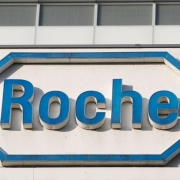Researchers at Yale University published research in Molecular Biology and Evolution describing a new molecular analysis approach to quantify DNA changes that contribute to cancer growth.
Development of a new cancer treatment pioneered by Roche was thrown into doubt on May 11 when the immunotherapy drug failed to slow progression of lung cancer in a second trial, hitting the Swiss pharmaceutical maker’s shares.
Gilead snaps up rights to promising Dragonfly NK engager program
Advanced Non-Small Cell Lung Cancer, Breast Cancer, Business, Collaborations, Gilead, Head & Neck Squamous Cell Carcinoma (HNSCC), Immunotherapeutics, Locally Advanced Squamous Cell Carcinoma of the Head and Neck (LA-SCCHN), Natural Killer Cells (NK Cells), Non-Small Cell Lung Cancer, R&D, R&D, RemdesivirA collaboration between Gilead Sciences and Dragonfly Therapeutics was announced May 2, with an end goal of bringing Dragonfly’s DF7001 natural killer (NK) engager program designed for patients with cancer or inflammatory diseases to fruition.
Regeneron and Sanofi Collaboration Receives Third FDA Drug Approval
Advanced Non-Small Cell Lung Cancer, Approvals, Blockbusters, Chemoradiation, Clinical Trials, FDA, Hedgehog Pathway Inhibitors, Monoclonal Antibodies, New Indications, PD-1/PD-L1 inhibitors, Progression-Free Survival (PFS), R&D, Regeneron Pharmaceuticals, Sanofi, Therapeutics, TumorsRegeneron and Sanofi’s checkpoint inhibitor Libtayo (cemiplimab-rwlc) won U.S. Food and Drug Administration approval for the first-line treatment of patients with advanced non-small cell lung cancer whose tumors have high PD-L1 expression.
AstraZeneca Plc’s cancer drug Imfinzi was approved in Europe and Britain for a spaced-out regimen in a common type of lung cancer to help reduce the frequency of hospital visits while continuing treatment.
Amgen presented positive topline data from the Phase II CodebreaK 100 trial of sotorasib in KRAS G12C-mutant advanced non-small cell lung cancer (NSCLC).
Sanofi and Regeneron halted a Phase III study of the checkpoint inhibitor Libtayo (cemiplimab) as a monotherapy treatment for advanced or metastatic non-small cell lung cancer due to early signs of significant improvement in overall survival.
China’s Innovent Biologics forged a licensing agreement with biosimilar-focused Coherus BioSciences to commercialize Innovent’s biosimilar candidate to Avastin (bevacizumab) in the United States and Canada.
Bristol-Myers immunotherapy combo outperforms chemo in lung cancer survival: study
Advanced lung cancer, Advanced Non-Small Cell Lung Cancer, Blockbusters, Chemotherapy, Clinical Trials, European Society for Medical Oncology (ESMO), Immuno-oncology, Immunotherapies, PD-1/PD-L1 inhibitors, R&D, TumorsAbout 40 percent of patients who received a combination of Bristol-Myers Squibb Co.’s immuno-oncology drugs Opdivo and Yervoy as an initial treatment for advanced non-small cell lung cancer were alive after two years, according to data presented at the European Society for Medical Oncology 2019 meeting.
Genentech announced positive data from the Phase III IMpower110 study evaluating Tecentriq as a first-line monotherapy compared with cisplatin or carboplatin and pemetrexed or gemcitabine (chemotherapy) in advanced non-squamous and squamous non-small cell lung cancer (NSCLC) without ALK or EGFR mutations (wild-type; WT).


 Reuters
Reuters




